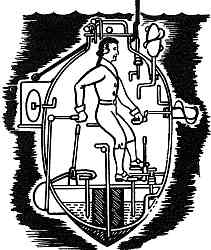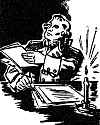|
|
|
46. George Washington, Patriot, Statesman
and Scientist
 Washington had financially aided the inventor, David Bushnell, in
developing the weapon. The pilot of the submarine was to come along
side of the" Eagle," attach the time-bomb and then escape. But its
discovery by the British soldiers had frustrated the plan. Later
Washington in writing to Jefferson said "One accident or another always
intervened. I then thought, and still think, that it was an effort of
genius." Washington did not have sufficient experience in developing
new ideas to know that Bushnell's submarine was just going through the
usual troubles incident to the development of any new device. Recently,
the pictures of the British two-man torpedo brought to mind Bushnell
and his submarine of 168 years ago.
Washington had financially aided the inventor, David Bushnell, in
developing the weapon. The pilot of the submarine was to come along
side of the" Eagle," attach the time-bomb and then escape. But its
discovery by the British soldiers had frustrated the plan. Later
Washington in writing to Jefferson said "One accident or another always
intervened. I then thought, and still think, that it was an effort of
genius." Washington did not have sufficient experience in developing
new ideas to know that Bushnell's submarine was just going through the
usual troubles incident to the development of any new device. Recently,
the pictures of the British two-man torpedo brought to mind Bushnell
and his submarine of 168 years ago.
 While we all regard Washington as one of our most outstanding
patriots and statesmen, the Father of our Country was a far sighted man
in many ways. He realized that that growth of his new country depended
not only on building cities and carving farms out of a wilderness, but
also on the pioneering of new ideas, which would ultimately produce new
tools for the great task that lay ahead. He accordingly advocated and
signed the first patent law framed
by Congress to protect the ideas of
American inventors.
While we all regard Washington as one of our most outstanding
patriots and statesmen, the Father of our Country was a far sighted man
in many ways. He realized that that growth of his new country depended
not only on building cities and carving farms out of a wilderness, but
also on the pioneering of new ideas, which would ultimately produce new
tools for the great task that lay ahead. He accordingly advocated and
signed the first patent law framed
by Congress to protect the ideas of
American inventors.
|
|
 Washington had financially aided the inventor, David Bushnell, in
developing the weapon. The pilot of the submarine was to come along
side of the" Eagle," attach the time-bomb and then escape. But its
discovery by the British soldiers had frustrated the plan. Later
Washington in writing to Jefferson said "One accident or another always
intervened. I then thought, and still think, that it was an effort of
genius." Washington did not have sufficient experience in developing
new ideas to know that Bushnell's submarine was just going through the
usual troubles incident to the development of any new device. Recently,
the pictures of the British two-man torpedo brought to mind Bushnell
and his submarine of 168 years ago.
Washington had financially aided the inventor, David Bushnell, in
developing the weapon. The pilot of the submarine was to come along
side of the" Eagle," attach the time-bomb and then escape. But its
discovery by the British soldiers had frustrated the plan. Later
Washington in writing to Jefferson said "One accident or another always
intervened. I then thought, and still think, that it was an effort of
genius." Washington did not have sufficient experience in developing
new ideas to know that Bushnell's submarine was just going through the
usual troubles incident to the development of any new device. Recently,
the pictures of the British two-man torpedo brought to mind Bushnell
and his submarine of 168 years ago. While we all regard Washington as one of our most outstanding
patriots and statesmen, the Father of our Country was a far sighted man
in many ways. He realized that that growth of his new country depended
not only on building cities and carving farms out of a wilderness, but
also on the pioneering of new ideas, which would ultimately produce new
tools for the great task that lay ahead. He accordingly advocated and
signed the first patent law framed
by Congress to protect the ideas of
American inventors.
While we all regard Washington as one of our most outstanding
patriots and statesmen, the Father of our Country was a far sighted man
in many ways. He realized that that growth of his new country depended
not only on building cities and carving farms out of a wilderness, but
also on the pioneering of new ideas, which would ultimately produce new
tools for the great task that lay ahead. He accordingly advocated and
signed the first patent law framed
by Congress to protect the ideas of
American inventors.







